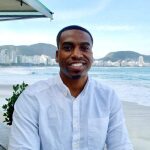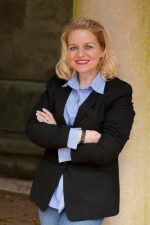It is universally acknowledged that the oil and gas industry is dominated by highly technical professionals. That said, after working with and befriending people of various educational backgrounds, I have become very passionate about raising awareness of how people with degrees outside the usual degrees such as engineering, geology, or business are still critical to this industry. In this article, I share some of my thoughts on how my education has benefited my oil and gas career and also profile two professionals in the industry who have achieved success despite having unique backgrounds. - Stephen Forrester, TWA editor
English Graduate Turned Technical Writer and Marketer
Stephen Forrester, Marketing and Technical Communications Writer, NOV

As I worked through the rigors of both an undergraduate and a master’s degree in English, I was frequently asked about my plans for those degrees. What would I do, people would ask with a mixture of wonder and incredulity, what could I do with English degrees in this day and age? What kind of career could I possibly have, particularly in oil- and technology-driven Houston, a progressive city but one where the liberal arts had nonetheless fallen out of favor due to shifting socioeconomic and educational conditions?
Even at the university, I frequently studied under professors who relentlessly insisted that there were only two paths forward: a career in education, or a career in academia. I briefly explored the former before realizing my passion lay elsewhere, and then pursued my master’s degree in the hope of getting ahead of the curve. I was confident not necessarily in the degrees themselves so much as in the power of words, ideas, and communication.
Fast-forward to the present, where I have achieved success in this early stage of my career. I entered the oil and gas industry, which is traditionally perceived as being very unresponsive to those with liberal arts degrees, as a technical editor at Lloyd’s Register, going page by page through very long, detailed reports on subsea blowout preventer compliance inspections; that is, I entered this industry reviewing highly technical, time-sensitive material. Today, I work at National Oilwell Varco (NOV) in a hybrid role that combines aspects of technical writing with marketing communications. I have tried to push the fundamental truth that good writing leads to the creation of collateral that is polished, coherent, and definitively sells the value of a product/service vs. competitors’. Accomplishing this is an ongoing and challenging endeavor, as engineers can be hesitant to accept writing as little more than an expedient. Despite this, NOV has given me a great opportunity to learn, grow, and challenge myself. I have been published several times, as an author and a coauthor, and am always looking for new ways to hone my craft and move forward in my career.
I have also had the good fortune of joining the editorial board for The Way Ahead, which has provided me with additional chances to broaden my reach and learn new things. I have done all this despite having degrees that, initially, seemed to bar me from entering this very field. I took some important things from those degrees: the ability to think critically about complex issues, to articulate points in ways that people understand, to simplify and humanize often distant and inaccessible ideas, and to make meaningful connections. Now, one of my passions is to help others realize that they can do the same thing.
Music and Cultural Studies Graduate Turned HR Professional
Jared Hawkins, Human Resources Advisor, Shell

Looking back on how my music and cultural studies led me to my career in human resources (HR), I think a great deal of credit has to go to a work ethic instilled by my family, my studies as a musician, and distinctly my studies of the Spanish language and Hispanic culture. I’d be remiss if I did not acknowledge the hard work and tough love from my parents; I grew up with prime examples of being dedicated and responsible, but always keeping what you feel is right and just at the forefront of your life. Outside of the home, music and cultural studies give me a unique perspective for a career in the business world, specifically HR.
No good musician ever performs unprepared; you’ll practice and rehearse thousands of hours a year and be critiqued before, during, and after any audition or performance, driven to strive for an unreachable level of perfection. I take this same approach in my career as an HR practitioner. Whether it is developing an HR process, completing an investigation write-up to address employee concerns, or developing an external presentation on diversity and inclusiveness, I feel that poor work quality or sloppy delivery has never been an option. To me, that is the equivalent of walking out on the stage of a great music hall and fudging through notes because you did not get enough time to learn the piece. As someone still pretty green in his career working for one of Houston’s oil and gas majors, I have had to strike a balance with this approach while realizing that we are all human, and we all make mistakes.
Studying Spanish and the cultures in Latin America led me to travel more, which helped me understand that different ways of life are to be celebrated and valued. The critical thinking skills demanded of me from my professors throughout studies of the arts, cinema, history, cuisine, and politics, to name a few, taught me to appreciate other perspectives and insights even as a “cultural outsider.” These studies and my experience learning the Spanish language greatly developed my ability to empathize with those who may not look, think, or act like me. In a nutshell, Hispanic studies taught me to be curious about the “other,” which helped me to take criticism constructively, to listen to understand instead of listening to respond, and to view a challenge as an opportunity to arrive at a stronger decision point.
On occasion, mentors and sponsors will point out to me that I should be proud of my unconventional background as an HR professional. While I still work to continuously learn and upskill the foundational parts of my HR responsibility, I no longer dread the question about how I got to where I am; if anything, I hope it encourages others to speak up about interests and passions outside of our 9-to-5 desk jobs. To be as engaged and high-performing as possible during those 40+ hours a week, we should feel comfortable and inspired to bring our entire selves to work.
Communications Graduate Turned CEO, Visionary Women’s Advocate
Katie Mehnert, CEO and Founder, Pink Petro and Experience Energy

I lead Pink Petro, a global community of energy professionals providing digital learning, formal and informal networking, mentoring, and development, to bring about the next generation of women in the industry. The platform provides content, conversation, resources, careers, advocacy, and change. Pink Petro’s ultimate goal is to help develop the pipeline of female talent within the energy industry and attract new people into the sector.
Prior to Pink Petro, I held various health, safety, and environment (HSE), change, and organizational effectiveness leadership roles at both BP and Shell worldwide. I conceived of the idea of Pink Petro on a flight from London to Houston in 2013, later leaving a director-level position at BP to launch the Pink Petro project. Seeing that women were struggling to penetrate a dominantly male industry, and witnessing the widespread impact of the severe crash in oil prices, I felt and understood my true calling: I would serve as a disruptive catalyst to drive a talent shift for women in the sector. I docked my pay to zero, withdrew funds from my portfolio, and formed Pink Petro.
As I achieved success in the industry, people often wondered about my degree in communications. One early mentor from my early HSE role, reinforced that my degree is valuable. She asserted that someone who could speak well with others, work with varying personalities, and provide the support necessary to ensure that people understood safety was a critical asset; how could we attempt to create a culture of safety if our employees did not even understand why we needed to do so, or how? I have taken this belief forward in my career: Your degree is only one half of the coin. What is more important, I have found, is how we work with and inspire others. You must have focus, discipline, and the ability to operate at multiple levels and in multiple cultures, something I gained from my experiences working closely with employees every day. Good leaders listen, learn, and leverage the best parts of the team, consistently delivering improvement and results. Resolve is also important. People generally talk about problems or overanalyze the issues, but I prefer to take action, create solutions, and get things done.
The best part of any job I have had is helping to effect change in the lives of everyday people. I get to meet and work with some of the incredible unsung heroes in my industry, individuals who need their stories shared and elevated. I take particular joy in seeing women succeed, and strive every day to blend genders, nationalities, and generations together to drive inclusivity in the places we work and live.
The views and opinions expressed herein are those of the authors/presenters and do not necessarily reflect the views of referenced companies, their affiliates, or their employees.

